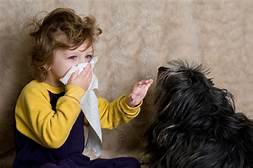Can Pet Dander Make You Sick?
If you're allergic to pets, you know that being around them can make you miserable. Sneezing, a runny nose, itchy eyes, and a scratchy throat are just a few of the symptoms you may experience.

What is Pet Dander?
Pet dander is a common allergen that can cause allergic reactions in some people. It is made up of tiny flakes of skin that are shed by animals with fur or feathers. Dander can be found on the animal's coat, in their bedding, and even in the air.
When an allergic person comes into contact with pet dander, their immune system overreacts. The immune system produces antibodies that attack the dander, which causes the release of histamine and other inflammatory chemicals. These chemicals cause the symptoms of an allergic reaction.
Are All Pets the Same?
Some animals produce more dander than others. Cats are typically considered to be more allergenic than dogs, but this can vary depending on the individual animal. Some types of dogs, such as poodles and bichon frises, are considered to be hypoallergenic because they produce less dander. However, no dog or cat is truly hypoallergenic.
Fish and reptiles are generally not considered to be allergenic. However, their food and water can attract dust mites and other allergens, so it's still important to clean their habitats regularly.
What Can You Do if You're Allergic to Pet Dander?
If you're allergic to pet dander, there are a few things you can do to reduce your symptoms:
- Avoid contact with animals that you're allergic to.
- If you have a pet, keep it out of your bedroom and other areas where you spend a lot of time.
- Wash your hands after petting an animal.
- Use a HEPA filter in your vacuum cleaner and change the filter regularly.
- Dust your home frequently with a damp cloth.
- Get allergy shots. Allergy shots can help to reduce your sensitivity to pet dander over time.
When to See a Doctor
If your allergy symptoms are severe, you should see a doctor. They can prescribe medication to help control your symptoms and recommend other strategies for managing your allergy.
Declaration: All article resources on this website, unless otherwise specified or labeled, are collected from online resources. If the content on this website infringes on the legitimate rights and interests of the original author, you can contact this website to delete it.





